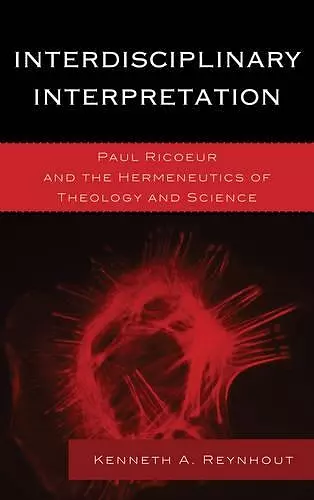Interdisciplinary Interpretation
Paul Ricoeur and the Hermeneutics of Theology and Science
Format:Hardback
Publisher:Lexington Books
Published:20th Jun '13
Currently unavailable, and unfortunately no date known when it will be back
This hardback is available in another edition too:
- Paperback£45.00(9781498515870)

The past fifty years has seen the emergence of an energetic dialogue between religion and the natural sciences that has contributed to a growing desire for interdisciplinarity among many constructive theologians. However, some have also resisted this trend, in part because it seems that the price one must pay for such engagement is much too high. Interdisciplinary work appears overly abstract and methodologically restrictive, with little room for systematic theologians self-consciously operating within a particular historical tradition. In Interdisciplinary Interpretation: Paul Ricoeur and the Hermeneutics of Theology and Science, Kenneth A. Reynhout seeks to address this concern by constructing an alternative understanding of interdisciplinary theology based on the hermeneutical thought of Paul Ricoeur, generally recognized as one of the most interdisciplinary philosophers of the twentieth century. Appealing to Ricoeur’s view of interpretation as the dialectical process of understanding through explanation, Reynhout argues that theology’s engagement with the natural sciences is fundamentally hermeneutical in character. As such, interdisciplinary theologians can faithfully borrow meaning from the sciences through a process of “interdisciplinary interpretation,” a process that can honestly attend to the legitimate challenges posed by the natural sciences without automatically requiring the evacuation of theological norms and convictions. Reynhout’s creative appropriation of Ricoeur’s hermeneutics succeeds in providing a novel interdisciplinary vision, not only for theology but also for interdisciplinary work in general.
Kenneth Reynhout . . . has made a novel contribution not only in the science and theology dialogue but also in the philosophy of science and hermeneutic and interdisciplinary studies. . . . [A] superb work of scholarship. The book is consistent with Ricoeur’s thought but has a freshness that goes well beyond Ricoeur . . . [This] book is highly accessible and can, therefore, act as an introduction to both Ricoeur and to interdisciplinary studies in science and theology. * Theology and Science *
Furthermore hermeneutics could function as a bridge between interreligious/intercultural dialogue and the dialogue between theology and natural science. This is exactly what for me personally is so exciting about Kenneth A. Reynhouts’ study Interdisciplinary Interpretation – that it crosses borders between disciplines so far not in dialogue with each other and shows similarities i.e. analogies between different interdisciplinary dialogues as well as between the dialogue between theology and natural science and interreligious dialogue. * European Society for the Study of Science and Theology *
For those who have worked in the science and theology dialogue for many years this book comes like a breath of fresh air. Here at last is a careful and well-argued philosophical argument for that dialogue in terms that make sense for the constructive theological task. By mining the work of Paul Ricoeur the author gives us a much needed hermeneutic basis for that dialogue, culminating in a novel thesis, namely, an argument for faith seeking understanding through explanation. But this is no facile fideism, but rather a respectful acknowledgment of the importance of commitment and self-awareness of the experience of faith in the constructive task. Although this book is geared primarily to a theological audience, scientists coming to interdisciplinary conversations would benefit enormously from a careful reading of this book. Further, the author has argued convincingly in my view that theology is the poorer without such dialogue, so theologians are beholden to consider particular ways in which they can take up the challenge presented here. While this book is no easy read, and the language is primarily philosophical rather than theological, it is well worth the effort. -- Celia Deane-Drummond, professor of theology, University of Notre Dame
In this timely work, Kenneth Reynhout offers a foundation for establishing a sophisticated dialogue between theology and the natural sciences. He argues not only for the hermeneutic character of each but for the hermeneutic nature of the interchange. Particularly apt is his insistence that explanation —the traditional hallmark of the sciences— and understanding —the traditional hallmark of theology and the humanities— should not be characterized as separate spheres but as dialectical. In extending hermeneutic analysis to the natural sciences, Reynhout builds on and also responsibly goes beyond the hermeneutics of Paul Ricoeur. At the same time he importantly enlarges our conception of hermeneutics’ reach. -- George H. Taylor, Professor of Law, University of Pittsburgh
ISBN: 9780739180617
Dimensions: 236mm x 158mm x 21mm
Weight: 463g
210 pages